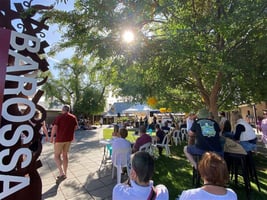When Knowledge Sits Behind a Desk
 Behind the desk at MAP HQ
Behind the desk at MAP HQ
Something I love about working with My Ability Pathway is how every person on the team is included, respected and valued. Every contribution has merit, and the intrinsic knowledge brought by each team member is celebrated.
And as an organisation, MAP is driven to develop that knowledge, build skills and empower team members. This is exciting yet can also be daunting. People may feel lost and overwhelmed when taking on new positions or accepting promotions. Change can be confronting, even when it’s positive and offering opportunities to those involved.
It’s vital to offer support through any type of change – and equally vital to ask for it when needed.
Sometimes it’s difficult to know where or who to ask for that support. Channels of communication can be complicated, people’s availability varies and for a lot of us, we just want to grin and bear it.
Something we’ve identified at MAP is the extensive knowledge held by our administrative team, knowledge that has grown from grassroots work in the disability sector. Several members of our HQ squad started their careers as support workers, studying, learning and supporting clients. Over the years – and in some cases, decades – they have progressed to different roles, including client management, team leadership and executive support.
So, what happens to all the knowledge they’ve developed on the frontline?
It sits behind a desk.
As MAP expands and builds our teams, I’ve been asking myself the same question on repeat: How do we spread that knowledge to the people that could really use it?
Let’s get personal:
My role at MAP is to provide executive support to Barb and Charlotte, our Director and General Manager respectively. Before this, I worked as a Support Coordinator for six years across MAP and another company. Prior to that, I worked in SIL settings, first as a support worker then as the equivalent of a Key Worker. I spent nearly a decade in Aged Care across residential and community, and before that I was a support worker in day options for a disability support provider.
Next year will be my 20th anniversary working in the care sector.
I’ve worked extensively with autism, dementia and managing behaviours of concern. Documentation, medication, manual handling … they’re all second nature to me. From personal care to SIL applications, I’ve done it, with the NDIS and before the NDIS.
Now I spend my time providing Support Coordination to a coupe of complex clients while otherwise supporting MAP with executive functions, communication and project work.
My knowledge sits behind a desk.
I’m not the only one.
So how do we spread that knowledge to the teams? How can we make sure the experience and learning – not just mine, but everyone across MAP – is shared with those who may benefit from it?
Answering this question is a journey we take together. With communication shared across our platforms, our monthly MAP Chats podcast and with MAP’s commitment to ongoing learning through Go1 and the Pathway to Success program. As an organisation, we prioritise information sharing in every direction. To safely and effectively support our clients, we need the valuable insights only frontline team members can provide. Never be afraid to speak up. What you know and see could be vitally important.
Every single person on the team has irreplaceable knowledge. The tiniest of details and small observations we make every day when interacting with clients, loved ones and providers adds up to a network of information that everyone can use. Never undervalue the information you bring to the team. It all combines to create a network of support.
There’s a quote I adore, from a book series I read about fifteen years ago. It has always stuck with me: “All knowledge is worth having”.
Interpret that how you will. I only encourage you to consider … who can help you? Who might know something you want to learn? It may be a person you wouldn’t have thought to ask.



.jpg?height=200&name=Image%20(1).jpg)